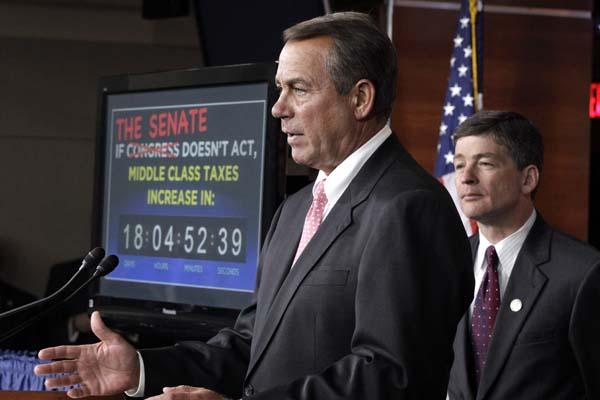Don't Be Fooled, Congress isn't Working

For the seventh time this year alone, Congress appears poised to pass another continuing resolution for spending for a fiscal year that has already begun.
If any fact indicts the dysfunction of both the Executive and Legislative Branches, that fact does.
Late last night, the House of Representatives passed a one-day Continuing Resolution for FY12 appropriations. Tonight, it may pass an omnibus appropriations bill that will fund 9 of the 12 annual appropriations bills. Those bills should have been passed and signed into law more than 2 months ago. Negotiations under way as we write could yield an omnibus by Friday night (the expiration date of the present CR), which would clear the decks for the more prolonged and painful debate on extending Unemployment Insurance, preventing a large decrease in health care providers under Medicare, and extending in some form the payroll tax holiday.
Although the two measures are legislatively and legally separate, Congressional deliberations and negotiations have combined the two. We suspect that the CR for FY12 will pass more quickly than the payroll tax, et al., bill.
This kind of last minute silliness has barely caused a media ripple this week. Ten years ago, the threat of a government shutdown would lead on evening news starting a week in advance. It barely makes the news now, until less than 24 hours remain until expiration of spending authority.
The country, of course, has given up trying to keep track of these gyrations. They don’t know if the President has been involved in any significant way (he hasn’t), what the specific issues are (many members of Congress themselves don’t know), nor what is in either bill (and, again, only a few members and senior staff really know). All they know is this—these folks can’t get their work done on time, act like kids squabbling in a sand box most of the time, and that neither the Obama “change” of the 2008 elections, nor the Tea Party “change” of the 2010 elections have done anything noticeable.
Of course, members of both parties have enjoyed dumping on Congress for years now. Voters are starting to show the same disdain of the institution that the members reveal when they use anti-Washington blather as campaign talking points. How anyone thinks he or she isn’t destroying the institution of which they are members, without hurting the regard in which they themselves are held, has to be left to psychologists’ analyses. Obama hasn’t changed Washington, D.C.; the Tea Party hasn’t.
One day back in the mid-1980s, President Ronald Reagan gathered up two 10-pound mounds of paper and used them as speech props. He thundered, “We will never do this again!” Those two stacks of papers were a comprehensive appropriations bill and a reconciliation bill. A year after his thundering, the President once again signed into law another continuing resolution. This is not to say that these kinds of incomprehensible bills, containing provisions that see the light of day only months after the bill becomes law, are regular order. They aren’t. But, they give many members, as well as the President, maximum leverage to get what they want.
So, a quarter of a century after the Reagan pledge, Congress and the Executive Branch still engage in the same behavior. Nothing has changed.
Indeed, the very notion of “change” implies that some “magic answer” exists. If we could only discover this answer, then we would make Washington, D.C., something that no other institution in the world is—efficient, driven by rational considerations, clear of any partisan or political ill-will. This is the way children think. “This is bad. We need to make it good. I know how.”
Instead of changing government, the policymakers of the nation would serve their neighbors better if they merely pledged to manage the chaos of human interaction as best as they could.
The media used to laugh at George H.W. Bush because he had no “vision.” We don’t need visions. We have plenty of visionaries—they populate the Occupy movement, the Tea Party movement, the Progressive caucus. They all know “the answer.” Perhaps because Bush I had faced real danger in World War II as an 18-year-old fighter pilot, and had seen the black inside of totalitarian regimes, regimes which knew “the answer” and were willing to kill millions of their own citizens to impose that answer, perhaps because of that, Bush I had more faith in actions than visions.
What we need are policymakers who admit no one “answer” exists and that the best we can do is allow as free a marketplace of ideas as we can, consistent with individual safety. And, then we vote.
But, that doesn’t make a very catchy campaign bumper sticker, does it?
Congress will pass government funding, it will eventually get some forms of UI, payroll tax holiday and Medicare docs’ fix. It will do it as it did the CR for FY11 this past Spring, as it did the increase in the debt ceiling in August—in the messiest, most painful way possible. And in the way that erodes most quickly the tiny bit of regard it now commands.

